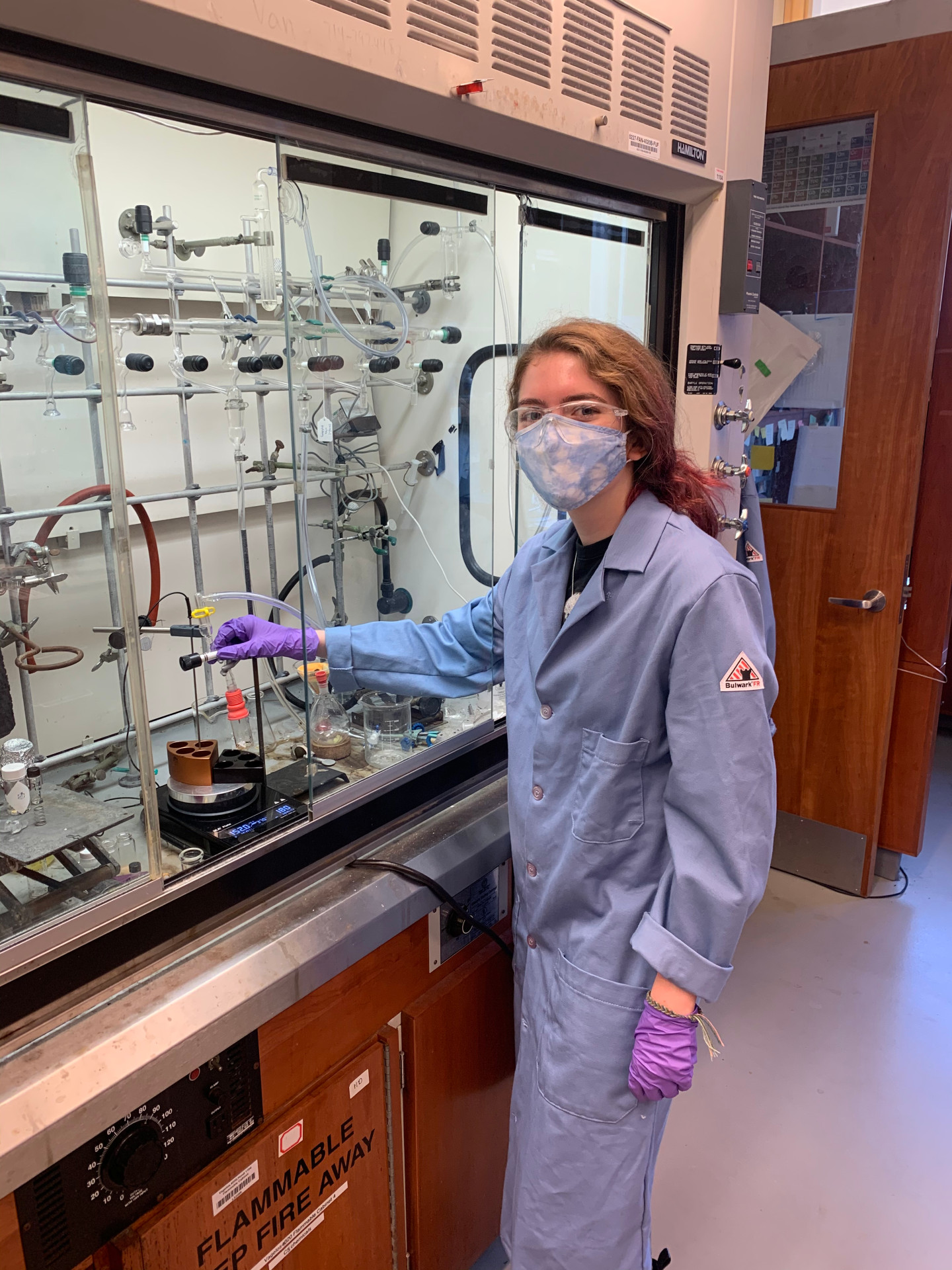On-Campus Chemistry
After waiting almost two years to join a chemistry lab, Calais Cronin, C’21, is one of the few students allowed on campus this fall to do research.
“CHEM101 changed my whole trajectory for college,” says Calais Cronin, C’21, an undergraduate researcher in the Goldberg Group, a lab working to develop new systems to efficiently produce chemicals and fuels from feedstocks such as natural gas and carbon dioxide. “Being in that class, I felt for the first time in a really long time that I had a direction and ambition and something to really work towards.”
Now a senior, Cronin took the general chemistry class with Karen Goldberg, Vagelos Professor in Energy Research, in her sophomore year. At the time, Cronin was a psychology major who’d already worked in a cognition and development lab. Though considering a career in medicine, she says she felt aimless.
All of that changed on the first day of chemistry class. Listening to Goldberg, also Director of the Vagelos Institute for Energy Science and Technology, describe her research, Cronin recalls, “All of a sudden I knew that’s what I wanted to do.”
Cronin is currently one of the few students allowed on campus to do research. With Eric Cueny, a postdoctoral researcher in the Goldberg Group, she’s studying the chemical upcycling of polymers, a new approach to transforming plastic waste into desirable products. An exciting moment came early in her research, Cronin explains, when she helped run a new reaction. It was only the third time it had been done.
Cronin herself is new to the Goldberg Group. Before receiving approval from the College to do on-campus research in early October, she’d been waiting for almost two years to work in a chemistry lab. She’d wanted to join Goldberg’s research group soon after taking general chemistry, but switching into the major in her second year meant she’d have to take more hands-on classes, like organic chemistry, before she could join the lab.
Though she’d enjoyed chemistry in high school, Cronin admits she was apprehensive about changing to the difficult major. “I had never done research [in chemistry] so this was very much a gamble for me,” she says. “But then in organic chemistry, I realized that I really enjoy being in the lab—doing the reactions and everything. I felt good about my decision at that point.” She reached out to Goldberg again last fall and they made a plan for Cronin to begin her research over the summer.
But then the Covid-19 pandemic hit, sending College students, including Cronin, home for the rest of the academic year. Disappointed but determined, she used the summer to complete a required physical chemistry class, freeing up her fall schedule for a possible return to campus.
With support from Goldberg and the Department of Chemistry, Cronin had to petition the College for a waiver that would allow her to enter academic buildings this fall. Now on her early-morning walks to the lab, Cronin reflects on how strange it is to be on campus. “I definitely forgot what it was like to go into an actual academic building,” she laughs.
Predictably, it’s quiet in the lab. Cronin and Cueny run reactions at one station, while a Ph.D. student works on his own project at a neighboring station. The teams in the Goldberg Group alternate shifts in the lab to maintain low capacity. As a result, Cronin hasn’t met everyone in the group yet, but meetings over Zoom have helped her to feel welcomed.
For Cronin, a former student Eco-Rep in the Office of Sustainability, the environmentally responsible methods researchers in the group seek to develop were the clincher in her decision to become a chemistry major. “I’m really passionate about the environment,” she says, “and I wanted to use a hands-on approach to fighting climate change.”
Cronin’s research is still in its early stages, but it’s a promising step toward developing more sustainable approaches to reusing discarded plastics. And she’s learning something new every time she steps into the lab, where the reactions she runs with Cueny and the doctoral students in the group bring to life concepts she’d previously encountered only in lectures.
“For a while, changing my major but not being in an official research lab, I was a little unsure about my future,” says Cronin, who plans to eventually pursue a Ph.D. in organometallic chemistry. “But now just being in the lab and being able to see the connections between all the chemistry classes I’ve ever taken—even just things from general chemistry that come back—I’m super thankful for it.”



